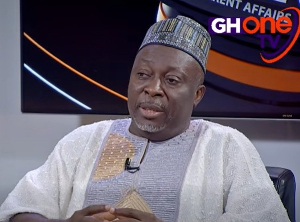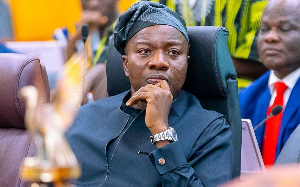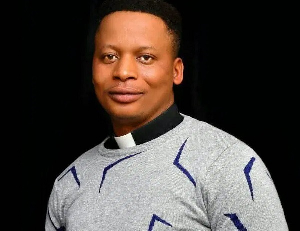Opinions of Friday, 10 June 2011
Columnist: Alfa, Abdur Rahman Shaban
Our State Penitentiary Facilities Sentenced to reform or to abuse?
Only when the judge/magistrate slams his gavel upon delivery of a conviction (criminal/civil) does the convict know that his/her freedoms by way of mobility, sleeping place, health, social and spiritual interactions, have been seriously curtailed.
And then are they (convicts) subsequently handcuffed, led by police/prisons officers into a waiting vehicle and whisked off to begin a new life - a life that I doubt if any person for any reason would be looking forward to - life in a prison, jail, a detention centre if you will, permit that I add to synonyms; a state penitentiary facility or penal colony.
Laws are made to be observed, failure to adhere to laws could best be described as a crime for which punitive sanctions as stipulated by the law books are to be applied. As is the case the world over, penitentiary facilities (Prisons) are built to help in the process of reprimanding and penalizing people who fall foul of the law for one reason or the other.
Contemporary penal systems however, place ‘the reformation process’ over and above reprimanding and penalizing the obdurate few who choose to do all things contrary to the very laws that are meant to serve the best interest of society.
In Ghana however, as is the case in most developing countries, prison facilities are widely under resourced, the main reason for which civil society groups are encouraged to complement the efforts of Governments in a holistic reformation of convicts.
The dichotomy between crime and justice could not be any much more emphasized in the peculiar case of Ghana, where convicts are stashed away for as long as the judge, in whose bosom justice resides, so discretionarily decides.
Having joined a Muslim Outreach group (of which I am Deputy General Secretary) to visit the Nsawam Medium Security Prisons, I put this piece together on behalf of the Hamdaniyya Dawah Committee (HDC).
This piece would look at five perspectives bordering on the legal, state, civil society, human rights and religious angles of the close to three hours or so that the group encountered officers and inmates of the Nsawam Prisons.
THE LEGAL PERSPECTIVE
The legal regime in Ghana seems to be very distant from the average Ghanaian who is barely able to afford the services of professionals (lawyers) who can lawfully represent their (clients’) interests in the law courts, where justice as it were, is delivered.
It is not for nothing that the Office of the Attorney-General and Minister of Justice, with Madam Betty Mould Iddrissu as minister, started the ‘Justice For All’ programme under which remand prisoners especially were freed, for the simple reason that their cases were unnecessarily dragging.
The case was no different as majority of the over 500 Muslim inmates (out of the regrettable 1,200 Muslim population in the prison) most of whom opened up to us, bemoaned the fact that they were on remand for varying prison terms.
We of the Committee have since proposed the following ‘pro bono’ efforts by the Legal Aid and private lawyers be intensified as published in a story in The New Crusading GUIDE newspaper; ‘Support us to help detained Muslims,’ (Thursday June 2, 2011) additionally the tentacles of the ‘Justice For All’ programme being extended to other prisons the country over.
Our heart bleeds for the remanded prisoners who for all you know, might be innocent because not all persons in prison may have committed the crimes for which they are held. In our opinion, the cliché that ‘the wheels of justice grind slowly’ is untenable, as by the way things stand now, they (wheels) seem to have ground to a stop,
STATE PERSPECTIVE
As the custodian of the correctional facility, the State has by far the most critical role when it comes to serving the best interest of convicts who are by their conviction under the care of the state.
In another story in the above mentioned paper; “In the matter of feeding Convicts… Group decries 60p G’ovt Subvention,’ (Tuesday May 3, 2011; page 7) we stated clearly our position on the FACT (caps mine) that convicts live on 20p per meal daily.
A woefully meager amount that we wondered and still wonder if is part of the ‘punishment’ being meted out to inmates. We must be mindful the inmates had sacrificed only their freedom of movement for the parameters of the penitentiary, but as things turned out, they sacrificed far more than that.
Their health situation as we found was deplorable with the lack of drugs ranking high on their ‘rights abuse’ profile. Albeit they are supposed to walk out of the place with skill in order not to slide into the vice that landed them there, that is miles away from the case.
Their workshops are bereft of the carpentry, masonry, plumbing, electrical and other training tools that would ideally have make them self-sufficient post their detention.
We are no strangers to how convicts in other jurisdictions are managed at personal and communal, even at national levels to mutually beneficial ends in areas of construction, social work and self empowerment initiatives.
Perhaps there is the need to do a redefinition of the purpose of detention in order to guard against erosion of the successes that the massively under pressure and under resourced officers of the Ghana Prisons Service face in the line of ‘reformation.’
CIVIL SOCIETY PERSPECTIVE
The role of the state dovetails straight into the role of civil society groups as ours, which more often than not, is aimed at achieving particular ends - be it of religious influence in the case of religious bodies, media attention for corporate institutions and philanthropic overtures for other individuals.
Civil society has done a lot in the years gone by; it must do a lot more better and I dare say should be involved in what clearly is typical of showing concern for the plight of fellows who for a reason or the other, have found themselves on the wrong side of the law.
Hamdaniyya Dawah Committee, led by our leader and President, Sheikh Abdul Wahab Mahama, in our trip under the theme, “Safeguarding the Social and Spiritual Growth of Convicted Muslims,” sought to and did fraternize with Muslim inmates, donated items to them and shared with them a spiritual message of ‘tawbah’ (repentance).
If many more groups with whatever interests are to contribute their quota to a cause as worthy as reformation efforts of another human being, we develop fellow feeling which should translate to tolerance and symbiotic, peaceful coexistence insha Allah.
HUMAN RIGHTS PERSPECTIVE
In the light of many human rights issues relative to convicts viz conjugal rights and voting rights of convicts, we cautiously put across what we think are clearly ‘higher’ rights issues that should be addressed.
Without access to their cells, we can make reference to award-winning piece put together by Metropolitan TV’s Pete Dela Tengey, who had access to where inmates slept and how they did - even if they had the opportunity to do so.
Indeed, videos of the very deplorably shocking and dehumanizing conditions under which inmates were living at least on the inside meant that without doubt all funds geared towards exerting their conjugal and voting rights would serve them better if translated into sleeping space.
Zero in on their 20p breakfast, lunch and supper and I wonder how the two rights above debated could pass as more important in the general scheme of things, well prepared food to these prisoners as that which we sent was as valuable as the smile it put on their faces and the heartfelt delight with which they sought Allah to bless us.
Rights, yes; but on this score we might want to put these other rights on the back burner and look to the more basic rights of health, food, shelter and of training. These we are in doubt about.
RELIGIOUS PERSPECTIVE
As a Muslim group that went to the Prisons, we chose rights perspective of the very deplorable situation within the penitentiary facilities and hope we are pardoned for an obvious bias in this case.
Muslim inmates, for security purposes perhaps, are denied food at dawn as should be the case during Ramadan. We gathered that they literally have to carry their food at night into the cells and eat them cold at dawn, in these days of freedom of religion.
Then again, as a daily routine, they are forced to combine their sunset (Magrib) and evening (Ishae) congregational prayers as they are by the time of the latter prayer, meant to resign into their cells and retire for the night.
Our charge however, to Muslim leaders and other Muslim groups at least by our first of many trips to the facility, is for us to stand up and embark on individual or laudably concerted efforts to serve society by supporting prisoners.
GHANA PRISONS SERVICE
For most heavily under resourced state outfits as the PRISONS Service, one cannot but appeal unreservedly to the State to better equip them in their line of duty, especially so in the light of the very critical and sensitive role they play.
Established under an act of law, their mandate would wholly or partially remain in the statutes except and until such a time that they are empowered with necessary facilities and equipment to play their desired role and to better place them within the national development puzzle.
As a charge to the Service, doubling their steps in times of improved working conditions would be non-negotiable and we strongly contend that making do with immediately available resources is key; we unreservedly thank them for their support before, during and after our trip and hope to call on them again.
OBERVATIONS
Having gained access to the female and male prisons, we are left with no other option than to observe amongst other things the stark and glaring degrees of security - the female Prisons had very tall walls and a huge wooden gate preceded by an iron one when approaching from within.
With a capacity of over 3,000 and still counting, the very huge iron gate and three other well-built iron fences we needed access before reaching the mosque precincts told the story of how virtually impossible it was for anyone to moot the idea of escape.
There was an iron fence as first barrier, then was the 25 blocks high, well built wall (by my count); the wall had broken bottles planted on them and both barriers were with barbed wires all round.
It may have been some three or so hours within the parameter and we (all 24 members) felt not just estranged, choking and cut from the world (mobile phones seized at the gate) my personal grief although with all of them for their very regimented and militarized life of the about 18-year old who tells me he was stashed away to serve a 50-year jail term, of which he had spent some two weeks - barely a month by now.
A life of reform it ideally should be, but indeed it is one far off that standard. In our efforts to better the lot of our unfortunate fellows, we pledge as a body to water the ‘seed’ planted at Nsawam in efforts at quality spiritual and social reformation, we are all involved.
By that and with the permission of the Director of Hamdaniyya Islamic School, under which the Hamdaniyya Dawah Committee thrives, Sheikh Yusifu Muash Akpopirebo, we slam our gavel and sentence ourselves and all to positive reformation efforts. Allah aid our efforts, guide our intents and illuminate our paths on that. Salam!
By Abdur Rahman Shaban Alfa (Deputy General Scretary, HDC) Email: alfarsenal@yahoo.com, newcguide@gmail.com
President of HDC, Sheikh Abdul Wahab Mahama, makes a presentation to Prison officers in front of the Nsawam Prison














